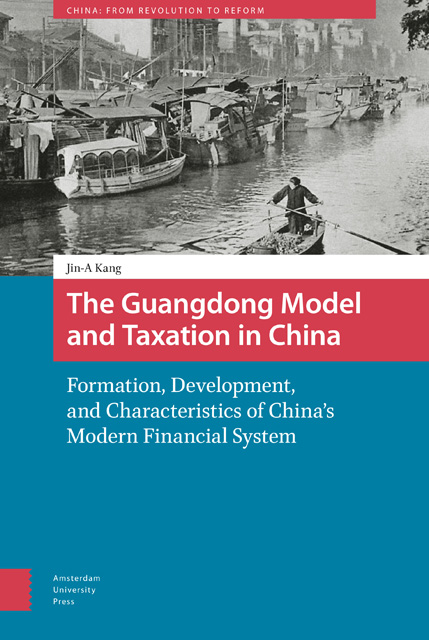 The Guangdong Model and Taxation in China
The Guangdong Model and Taxation in China Book contents
- Frontmatter
- Table of Contents
- Abbreviations
- Acknowledgments
- Introduction: The Modern Transformation of the Imperial Fiscal System: The Case of Provincial Finance in Guangdong
- Part 1 New Tax Revenues in Guangdong during the Republican Era
- Part 2 State-led Industrialization and the State Monopoly
- Part 3 Reform of Tax Collection
- Part 4 The Transition of the Modern Chinese Tax Structure in a Global Context
- Bibliography
- Glossary
- Index
Introduction: The Modern Transformation of the Imperial Fiscal System: The Case of Provincial Finance in Guangdong
Published online by Cambridge University Press: 10 January 2023
- Frontmatter
- Table of Contents
- Abbreviations
- Acknowledgments
- Introduction: The Modern Transformation of the Imperial Fiscal System: The Case of Provincial Finance in Guangdong
- Part 1 New Tax Revenues in Guangdong during the Republican Era
- Part 2 State-led Industrialization and the State Monopoly
- Part 3 Reform of Tax Collection
- Part 4 The Transition of the Modern Chinese Tax Structure in a Global Context
- Bibliography
- Glossary
- Index
Summary
The modern fiscal state in China was shaped in line with the creation and evolution of the modern fiscal state in the West. In the processes of state and nation-building, East Asian countries learned, imported, and transplanted the Western fiscal state system. The California School, introducing the idea of a “great divergence,” argues that the advanced regions of Asia, such as the central areas of China, India, and Japan, demonstrated a level of economic development that was compatible with that of the European countries. Further, the California School argues that the economic production mode of the advanced regions of Asia, that is, a Smithian growth model, was generally identical with that of Europe. However, from the perspective of a modern fiscal system, the European countries witnessed a fundamental change in their fiscal structure far earlier than the Asian advanced countries (or regions), even as there existed a considerable time lag across the European countries. It was only after the late nineteenth century that the fiscal structures of the Asian countries experienced a radical change.
Throughout the twentieth century, the momentum of modern fiscal state-building expanded state power and strengthened the role of the state against autonomous management by society in the distribution of wealth. This process was fueled by the unprecedented spread and scale of wars and the ideological appeal of the socialist regimes. Today, the twenty-first century is witnessing different levels of expansion of state power in the face of the Fourth Industrial Revolution, the widening gap between the rich and poor, the growing ecological crisis, and other global crises, such as the Covid-19 pandemic. State power has begun to assume the role of protector against the threats of both capitalism and communism, whereby the state obtains the authority to absorb the ever-growing ratio of national wealth for public distribution. The core of the expansion of state power is fiscal and financial power.
Current humane society faces various challenges: an unequal distrisbution of social wealth, periodic financial and economic crises, a deteriorating environment, and a public health crisis and others. In terms of endeavoring to fight against those challenges, the Chinese state model and fiscal management reveals distinctive features in contrast with the current Western states.
- Type
- Chapter
- Information
- The Guangdong Model and Taxation in ChinaFormation, Development, and Characteristics of China's Modern Financial System, pp. 13 - 20Publisher: Amsterdam University PressPrint publication year: 2022


